Microsoft Surface Pro 3 Review
by Anand Lal Shimpi on June 23, 2014 3:55 AM ESTLaptop Performance
Just like with battery life, we need to evaluate the performance of Surface Pro 3 as both a laptop and a tablet. As a laptop, Surface Pro 3 delivers performance comparable to other Ultrabooks of similar specs - assuming we're talking about short bursts of performance. In prolonged workloads you'll see a bit of a gap, and even a slight regression vs. Surface Pro 2 due to the thermal design targets for the new chassis.
With the exception of the Work suite in PCMark 8 v2, we're mostly looking at performance in the range of a 13-inch MacBook Air - the prototypical Haswell ULT notebook. Surface Pro 3 is definitely in good performance company. In the Work suite however the MacBook Air (running Windows) is able to deliver around 16% better performance than Surface Pro 3. I'm guessing this has to do with thermals more than anything else.
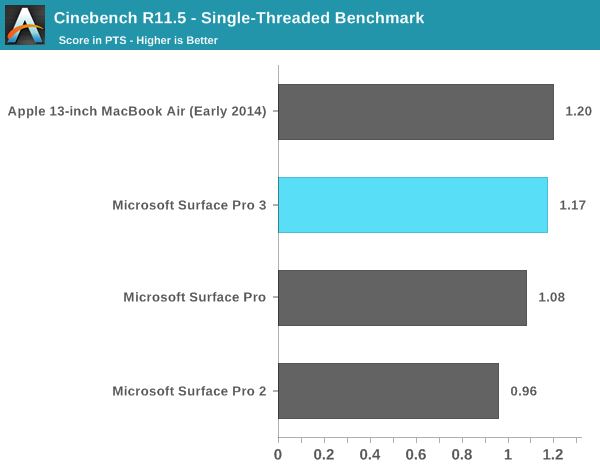
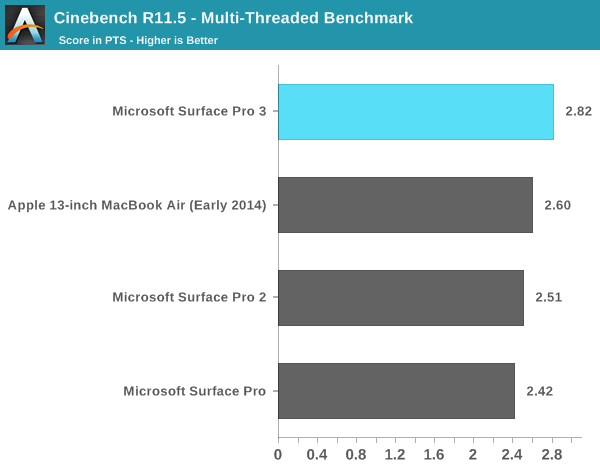
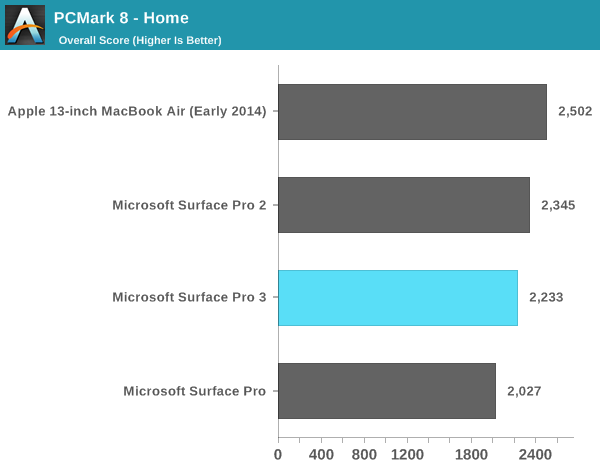
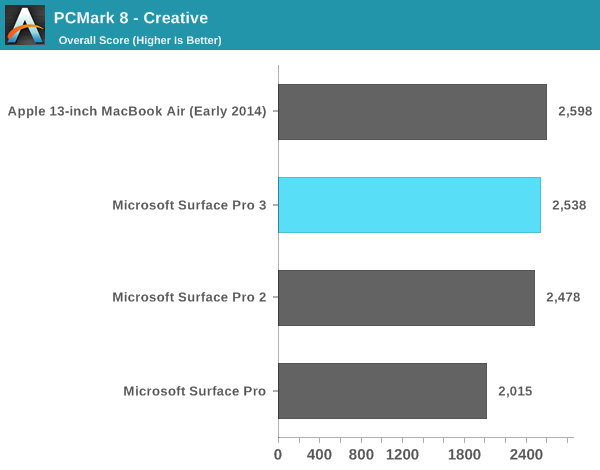
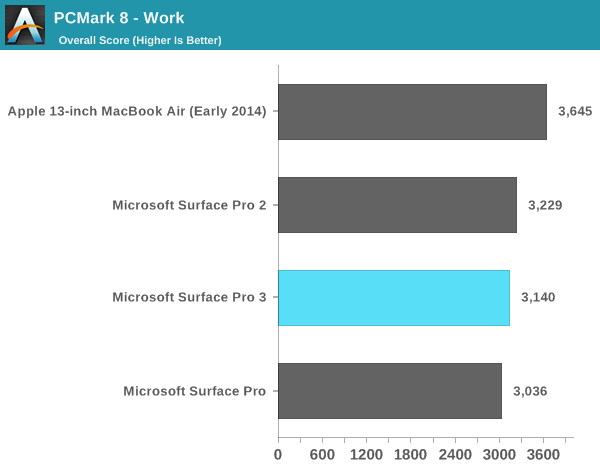
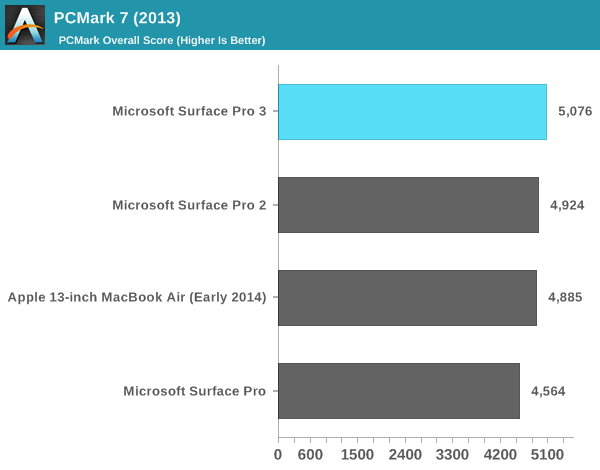
We see a similar story if we look at GPU performance:
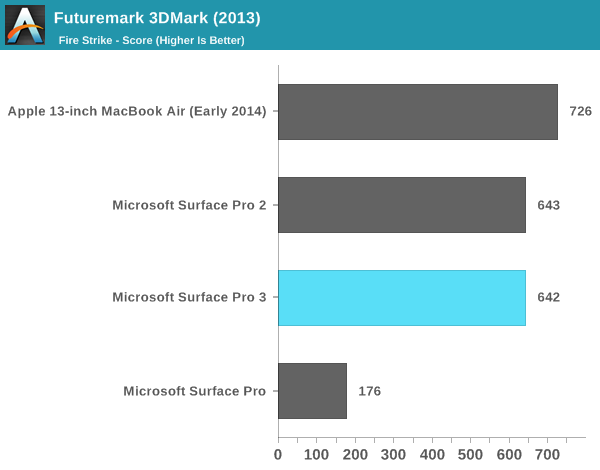
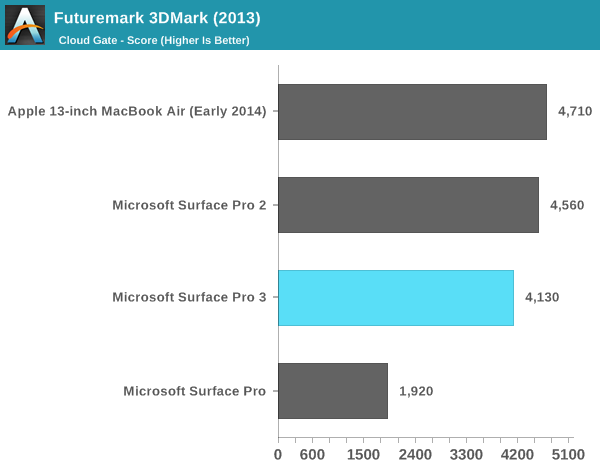
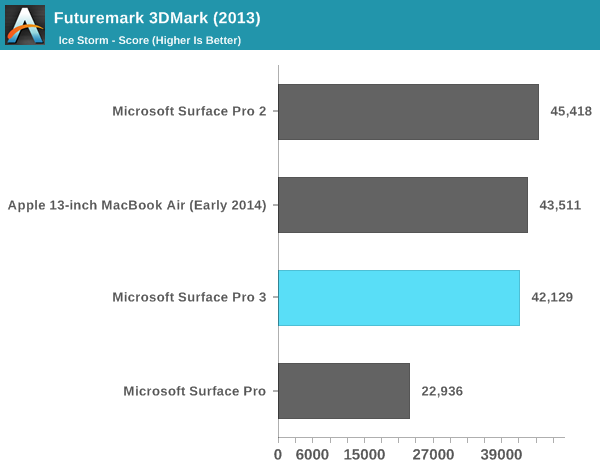
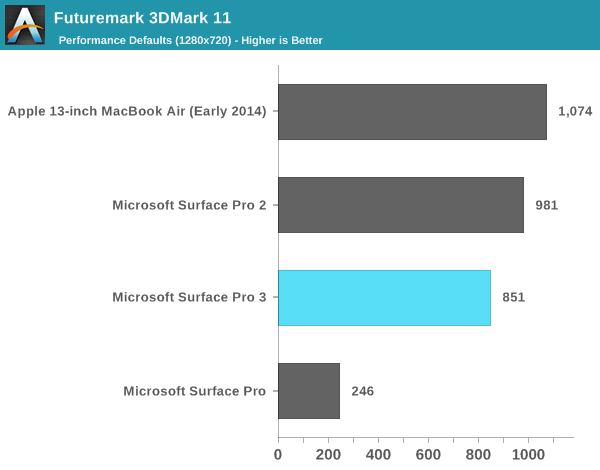
In terms of playable games, with some tweaking to detail settings you should be able to average 30 fps in titles like Dota 2. Running at the panel's native resolution is generally out of the question but for lighter titles on Steam like Transistor, you can have a reasonable experience. The higher end Core i7 Surface Pro 3 does ship with Intel's HD 5000 graphics instead of HD 4400 in the Core i5 review sample I tested. It's entirely possible that we see better gaming performance or thermal management (more EUs at lower voltage) in that design.
Just like in previous designs, Surface Pro 3 integrates a SATA SSD (likely M.2 this time). In this case Microsoft uses an OEM version of Samsung's SSD 840 EVO, a 3-bit-per-cell MLC design that we've found to be a pretty good value. I am disappointed we didn't see a move to PCIe storage but for general use I doubt there's much value in it. PCMark 8 v2's storage test isn't particularly stressful but it does show that Surface Pro 3's SSD is at least competitive with its predecessor and the MBA despite moving to TLC NAND.
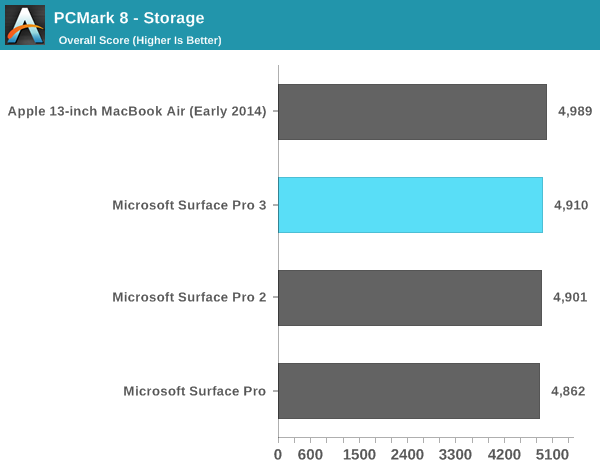










274 Comments
View All Comments
KaarlisK - Monday, June 23, 2014 - link
My one niggle is a lack of build-to-order options.An i3 is enough for me, and a 128GB may be enough for me, but I want 8GB RAM.
joaoasousa - Monday, June 23, 2014 - link
Yep, there's a missing 128 GB / 8 GB combination that would be a sweetspot for a lot of people. I hope MS listens to the feedback and opens up more combinations.DanNeely - Monday, June 23, 2014 - link
No need to open more combinations; just replace the current 4/128 model with an 8/128. Nothing other than a bottom tier windows computer should only have 4gb of ram any longer.tacitust - Tuesday, June 24, 2014 - link
4GB of RAM is nowhere near the same problem for most users when it's paired with an SSD (instead of an HDD).I have an old laptop with 3GB of memory. It was painful to use, because the swap file was so slow and I had to wait several seconds when switching between apps. I was considering upgrading to 4GB and perhaps even 8GB until I dropped in an SSD. Now there is no need, it's already so much faster.
For power users or gamers using memory hungry applications perhaps 8GB would be a good idea, but for the vast majority of users who use a typical mobile workload, paying for the extra 4GB is very likely a waste of money.
andrewaggb - Tuesday, June 24, 2014 - link
Personally I'd rather have 4gb of ram and a 256gb ssd than 8gb of ram and a 128gb ssd.or both... if it didn't drive the price up to $1350 without a cover...
joaoasousa - Tuesday, June 24, 2014 - link
The analysis I saw on the web say that with SSD the 8 GB are only required for gaming (which you can't do anyway) and running VMs. The price jump from 4 GB/128 to 8 / 256 is too much, I'll probably go for the 4/128 one.ccd1 - Monday, June 23, 2014 - link
My biggest reservations at this point is the future. Skylake is likely to be here in 12-15 months. Also, MS has shown a willingness to continually innovate in this space. I anticipate another leap in sophistication for the Pro at that time.skiboysteve - Monday, June 23, 2014 - link
We have said that every iteration. This one looks significant, so if you're in the market... It's a good time to buyccd1 - Monday, June 23, 2014 - link
But if I wait for Skylake, it might be 18-24 months before it is a dinosaur instead of 12! lol!stanwood - Monday, June 23, 2014 - link
This used to be how people felt about Apple products. Big win for MS that they were not scared to put out a pretty good Surface Pro and then iterate quickly.